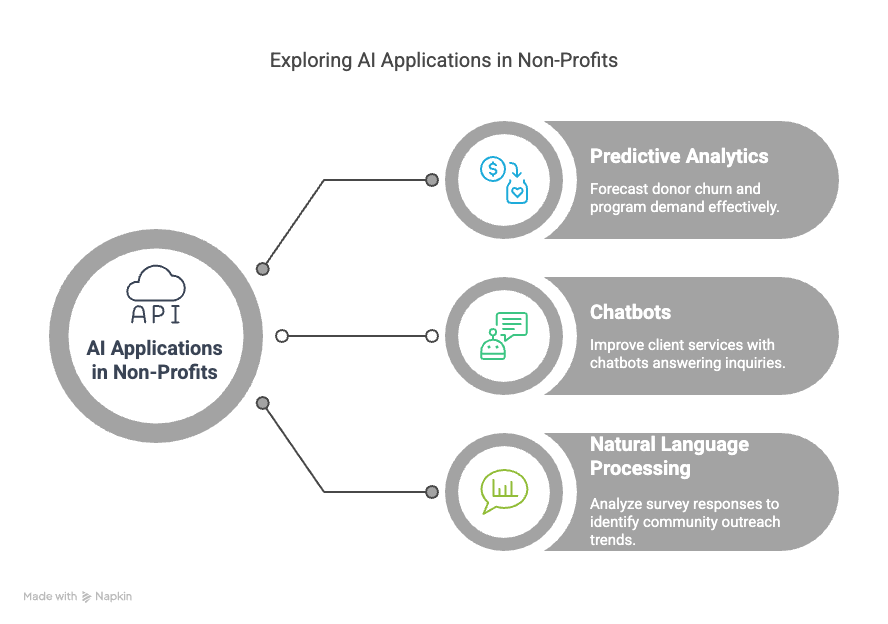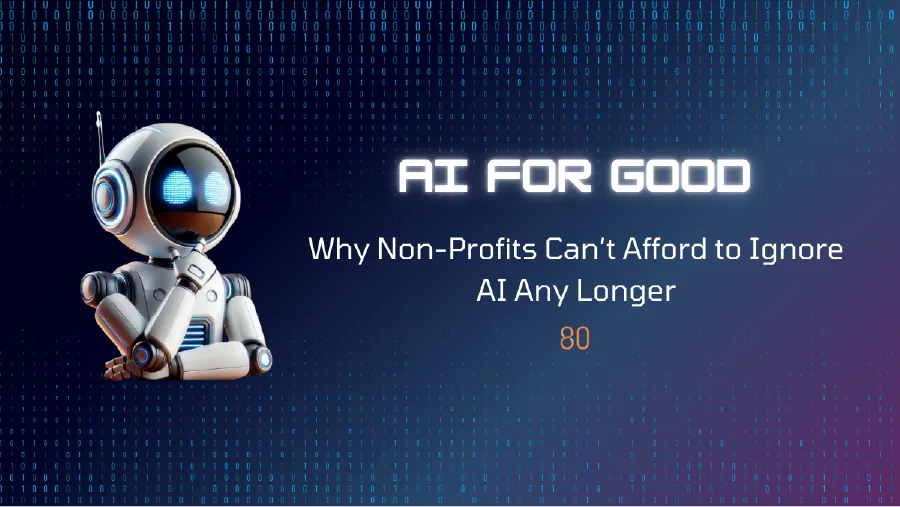More and more non-profits across Omaha and the Midwest are starting to ask the critical questions:
“Can artificial intelligence (AI) support mission-driven work in a meaningful, responsible way?”
“Can artificial intelligence (AI) support mission-driven work?”
The answer is a resounding yes.
Today, AI is no longer a futuristic concept reserved for big tech firms or well-funded startups. It is becoming a powerful tool to help non-profits scale their impact, streamline operations, and better serve the communities they care about most.
Why AI Matters for Non-Profits
Understanding the practical benefits of AI can help non-profits make smarter, faster decisions, especially in mission-driven environments like those in Omaha and the greater Midwest.
Non-profit organizations face unique challenges: limited staff, stretched budgets, and a growing need to deliver more with less. AI can bridge this gap by automating repetitive tasks, enhancing outreach, and improving fundraising outcomes.
Let’s say you’re managing donor communications. AI-powered platforms can personalize messages based on donor behavior, analyze giving patterns, and even recommend optimal follow-up times—freeing your team to focus on relationships instead of routines.
Use Cases for AI in the Non-Profit Sector
- Predictive analytics to forecast donor churn or program demand.
- Chatbots that answer common inquiries and improve client services—like helping visitors find resources at local food banks.
- Natural Language Processing to analyze survey responses and identify trends in community outreach.
These tools benefit not only non-profits, but also grantmakers, funders, and foundations seeking more transparency and measurable impact.

The Ethical Use and Data Privacy Dilemma
With great power comes great responsibility. As non-profits adopt AI, they must consider the ethical implications.
AI systems rely on data—lots of it. This means handling sensitive donor, volunteer, or client information. Organizations—including grantmakers and foundations—must take proactive steps to ensure responsible use of AI technologies.
Free Resource for Non-Profits in Omaha and the Midwest
Get our comprehensive checklist to help your non-profit organization in Omaha, Nebraska, Council Bluffs, or anywhere in the Midwest implement AI ethically and effectively. Perfect for foundations and grantmakers looking to modernize operations.
Protect Data Privacy
- Comply with regulations like GDPR or HIPAA, where applicable.
- Use secure systems and encrypt sensitive data.
- Never share personal data with an AI model unless you’re 100% sure it's secure.
- If in doubt, anonymize or remove sensitive information before input.
Audit AI Tools
- Check for potential algorithmic biases.
- Prevent reinforcement of systemic inequalities.
- Choose vendors that publish ethical guidelines and transparency reports.
Stay Transparent
- Explain how data is collected, stored, and used.
- Share AI policies with staff, stakeholders, and community members.
- Provide easy opt-out options for AI-driven communications.
Set Clear AI Goals
- Define what AI should and shouldn’t do (e.g., donor retention, volunteer onboarding).
- Ensure goals align with mission and values.
Staff Training & Adoption
- Train your team on safe, ethical AI use.
- Appoint a responsible AI oversight lead or committee.
- Identify areas where human oversight remains critical.
Evaluate AI Vendors Carefully
- Review data storage and usage policies.
- Look for nonprofit-friendly pricing and support options.
- Ask for references or case studies from similar organizations.
Monitor & Evaluate Impact
- Track performance against organizational KPIs.
- Collect feedback from staff and clients.
- Continuously improve or retire tools as needed.
Build Community Trust
- Discuss AI initiatives openly via newsletters or community forums.
- Invite questions and feedback from funders and partners.
- Maintain a public-facing AI FAQ or ethics statement.
Using AI ethically isn’t just about compliance—it’s about protecting the trust of your supporters, funders, and the broader community.
Getting Started: You Don’t Need a Tech Team
The good news? You don’t need a dedicated tech team to get started. Organizations like One80Labs have built impactful AI tools using no-code platforms—automating intake forms, summarizing reports, and more without hiring a single developer.
Low-code and no-code platforms make AI accessible to organizations of all sizes—including grantmakers and foundations looking to streamline workflows and enhance transparency.
Final Thoughts
AI is no longer a luxury; it’s a necessity. By embracing AI today, non-profits can unlock new levels of efficiency, engagement, and mission alignment.
Ready to see how AI can help your organization?
Take the Free AI Audit at One80Labs.com to discover three custom ways AI can help your nonprofit, grantmaker, or foundation work smarter—not harder.
